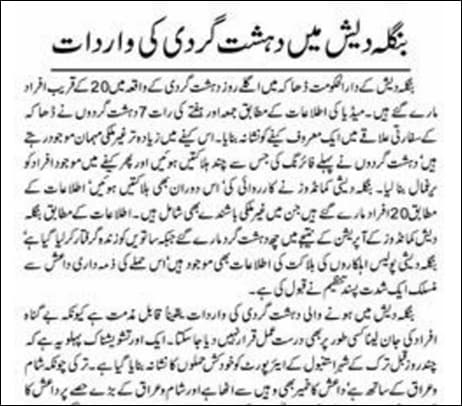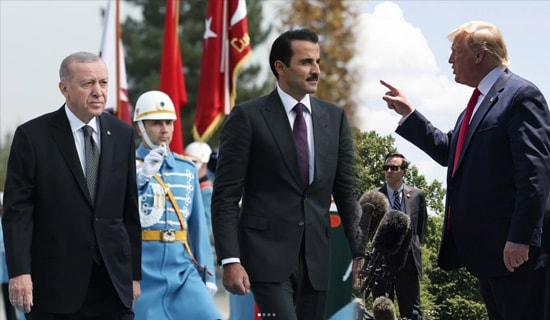On the night of July 1, 2016, jihadis laid an 11-hour siege to a café in the diplomatic zone of Dhaka, the capital of Bangladesh, and selectively killed 20 non-Muslim hostages, mostly Italian and Japanese nationals, after they failed to recite Koranic verses. Some of the hostages, who spoke Bangla or were able to recite the verses, were allowed to leave. Social media accounts claiming to belong to ISIS and Al-Qaeda took responsibility for the terror attack.
However, on July 3, the Bangladeshi government said that home-grown terrorists had orchestrated the attack. According to a report on the Times of India website, Bangladesh's home minister Asaduzzaman Khan told reporters on July 3: "Let me clear it again, there is no ISIS or Al-Qaeda presence or existence in Bangladesh... The hostage-takers were all home-grown terrorists, not members of ISIS or any other international Islamist outfits..." He added: "We know them (the hostage-takers) along with their ancestors, they all grew here in Bangladesh... they belong to home-grown outfits like JMB (Jamaatul Mujahideen Bangladesh)."
After the attack, the Pakistani Urdu daily Roznama Express published an editorial examining the likely implications the terror attack would have for the wider South Asia region.

Following are excerpts from the editorial:
"The act of terrorism that happened in Bangladesh is indeed condemnable because taking the life of innocent individuals cannot be declared a correct act. One more aspect of concern is that a few days ago, the airport of the Turkish city of Istanbul was made the target of suicide attacks. Since Turkey is adjacent to Syria and Iraq, and the ferment of the Islamic State (ISIS) has arisen from there and ISIS controls large parts of Iraq and Syria, attacks in Turkey and the Middle East are understandable.
"However, the attack in Dhaka has proved that the Islamic State has succeeded in establishing its roots in the region of the Pakistan-India Subcontinent [i.e. South Asia]. Without a doubt, the Bangladeshi government's [counter-radicalization] steps are also a matter of concern and worry for local Muslims. Despite this, the culture of Bangladeshi Muslims is based on the principle of non-violence. Extremism is not present among Bangladeshi Muslims.
"[The ability of] organizations like the Islamic State to find auxiliaries there indicates dangers whose consequences can affect all of South Asia. Meanwhile, as a result of this attack, the Bangladeshi government will take more stringent steps, and now it has found a reason to do so. After this attack, the secular class in Bangladesh will increase pressure on the government to undertake more measures against Islamic organizations. Therefore, attacks in Dhaka will become a cause of more difficulties for the Bangladeshi Muslims. The local politics of Bangladesh aside, the terror attack in Dhaka can be considered a harbinger of danger.
"Pakistan should also analyze this entire situation with seriousness. The Islamic State has its presence in Afghanistan too. Some sections [of society] have been consistently saying that some organizations in Pakistan also have connections with ISIS. With regard to this, there have been reports of wall-chalking [of pro-ISIS slogans] in different cities. However, the government has always said that the Islamic State has no presence in Pakistan. In the kind of situation that prevails in Pakistan and around it, one cannot rule out the probability of the presence of ISIS.
"The situation in Afghanistan is of the utmost importance. The Afghan Taliban are present in Afghanistan, as are terrorists fleeing from Pakistan. The Indian lobby is also active [in Afghanistan]. It uses every incident of terrorism for its objectives. The Indian lobby is very strong in Afghanistan. Similarly, the Indian lobby is very strong even in Bangladesh. The current government of Bangladesh enjoys the complete support of India. In such a situation, Pakistan will have to demonstrate much seriousness and intelligence.
"Pakistan's intelligence agencies will have to play an extremely vigorous and proactive role. In Pakistan, there is more than one active group that apparently wears an ideological mask but in reality mean to bedevil Pakistan with a lack of stability. On the one side are those groups, which are active in the name of religion; on the other side are such groups, which are doing their deeds under the linguistic and nationalistic flag[1] . A third group belongs to the crime mafia. They have some or the other connection between them. Pakistani intelligence agencies will have to uproot them."[2]




.jpg)